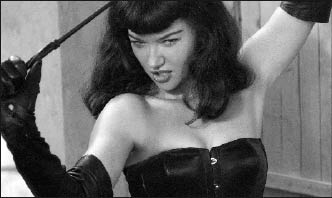Next story: Fujitsu U-Scan vs. Checkout Clerk
Not Normal, but Nice: The Notorious Bettie Page
by M. Faust

You might not be able to buy thigh-high, lace-up stiletto boots and leather garters at J. C. Penney’s (or maybe you can: I haven’t checked recently), but they’re hardly uncommon. I wouldn’t be surprised to find that the upstanding, civic-minded publication you are now holding contains an advertisement or two for local boutiques that sell such garb.
But there was a day when such items were as unseen, as unimaginable, as unthinkably lurid as…hmm, wrote myself into a corner there: Is anything “unthinkably lurid” in this new millennium?
And that’s the problem with The Notorious Bettie Page, Mary Harron’s biopic of the 1950s pin-up model whose bondage and domination photos became the subject of a Senate subcommittee investigation. It delves into this once-taboo area with the innocence of hindsight, seldom touching on the aura of depravity with which it was once regarded.
Though this is ostensibly a biography, Harron seems less interested in her subject than in the era for which she stands, just as in her previous films I Shot Andy Warhol and American Psycho, Valerie Solanas and Patrick Bateman gave witness to the unmoored 1960s and the voracious 1980s. She recreates 1950s Manhattan in a flat black-and-white, switching to oversaturated color for some scenes set in Miami (imitating the style of Bunny Yager, who photographed Page’s sunny nudes there).
Respectably and respectfully impersonated here by Gretchen Mol, Page was a properly bred Southern girl who moved to New York City hoping for a career in show business. Though no amount of Stanislavsky training was ever going to turn her into an actress, her natural beauty and unabashed manner made her an ideal camera subject. She had an unforced smile that seemed to say to the viewer, “If you’re happy, I’m happy,” investing even the seamiest material with an air of wholesome playfulness.
The script, by Harron and Guinevere Turner, never addresses why Page failed to move into a more mainstream modeling career, other than to imply that she regarded posing for pictures as a way to make a good living while taking acting classes. It depicts her sessions with photographers Irving and Paula Klaw (played by Chris Bauer and Lili Taylor as if they were the owners of a neighborhood deli), a brother and sister who sold movie photos from a Manhattan storefront under the studio where they took “specialty photos,” as the equivalent of girls playing dress-up at a pajama party. Baffled at the sight of the weird outfits she is given to wear the first time she poses for these higher-paying sessions, she is told by the matronly Paula that they are favored by certain respectable customers who seek relaxation from their stressful jobs.
Or, as fellow model Maxie (Cara Seymour) says of a patron who wants spanking photos, “He’s not normal, but he’s nice.” Like another movie about a post hoc icon of the 1950s, Tim Burton’s Ed Wood, this is most endearing for the affection with which it treats its oddball characters.
Of course, a film isn’t required to be a sociosexual dissection. That just seems to be the most logical reason for making a film like this. (Especially one funded by HBO, which has produced so many late-night series about the sexual predilections of Americans that it could devote a separate channel to them.)
Taken simply as biography, The Notorious Bettie Page (the title is meant ironically) offers a character who is likeable but not terribly interesting. Bettie’s childhood traumas seem to have so little to do with her adult personality that one wonders why the script bothered including them. And the film ends with Page’s religious revival (treated respectfully) and retirement from modeling in the late 1950s, with no hint of the difficult times to come (although, unlike Ed Wood, she survived to appreciate and profit from her public rediscovery). Avoiding either scurrilous satire or under-the-rock sensationalism, it’s a pleasant but rather pointless movie.
|
Issue Navigation> Issue Index > v5n20: Robert Creeley: A Poet in Buffalo (5/18/06) > Film Reviews > Not Normal, but Nice: The Notorious Bettie Page This Week's Issue • Artvoice Daily • Artvoice TV • Events Calendar • Classifieds |









 Current Issue
Current Issue